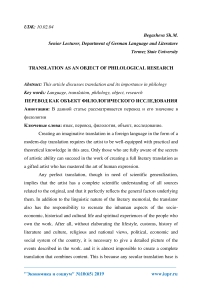Translation as an object of philological research
Автор: Begasheva Sh.M.
Журнал: Экономика и социум @ekonomika-socium
Рубрика: Основной раздел
Статья в выпуске: 10 (65), 2019 года.
Бесплатный доступ
This article discusses translation and its importance in philology
Language, translation, philology, object, research
Короткий адрес: https://sciup.org/140245929
IDR: 140245929 | УДК: 10.02.04
Текст научной статьи Translation as an object of philological research
Creating an imaginative translation in a foreign language in the form of a modern-day translation requires the artist to be well-equipped with practical and theoretical knowledge in this area. Only those who are fully aware of the secrets of artistic ability can succeed in the work of creating a full literary translation as a gifted artist who has mastered the art of human expression.
Any perfect translation, though in need of scientific generalization, implies that the artist has a complete scientific understanding of all sources related to the original, and that it perfectly reflects the general factors underlying them. In addition to the linguistic nature of the literary memorial, the translator also has the responsibility to recreate the inhuman aspects of the socioeconomic, historical and cultural life and spiritual experiences of the people who own the work. After all, without elaborating the lifestyle, customs, history of literature and culture, religious and national views, political, economic and social system of the country, it is necessary to give a detailed picture of the events described in the work. and it is almost impossible to create a complete translation that combines content. This is because any secular translation base is formed by the dialectical unity of form and content, giving it excessive privilege and diminishing attention to the form that undermines the dominant meaning of the content, and thus undermines the artistic and national character and historical identity of the work.
The basis of translational research is primarily a word, but the word is studied not in a way that is separate from its textual environment, but in the context of a different textual connection with other words, which is the means by which the writer fulfills the artistic and aesthetic goals of the writer. one.
The word is often used in literary and linguistic-methodological studies, as well as in translation studies, as an indirect, portable means of things and events. It is clear that a direct term in any literary text may not have a decisive role, directly or indirectly, in the implementation of the main objectives of literary translation.
The literary and metaphorical meaning of the writer is mainly based on the words and phraseological units with their colorful and figurative meaning. An indirect term gives a complete picture of the language and style of the writer and plays an important role in correcting the challenges facing the translation.
The purpose of the translation is to reproduce texts created using foreign language linguistics based on native language material. For this, the translator must first fully understand the original and then reproduce it in his own language. 1


